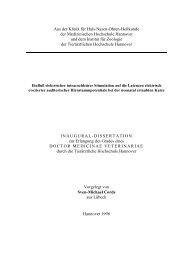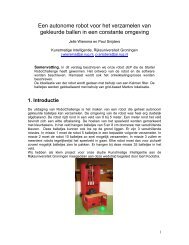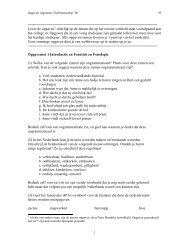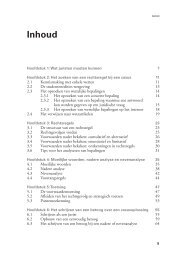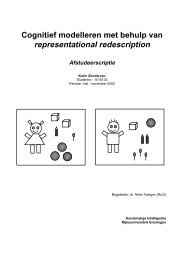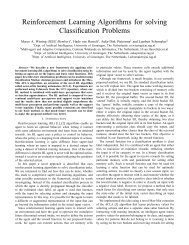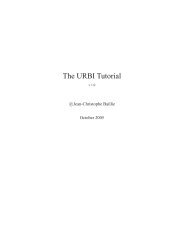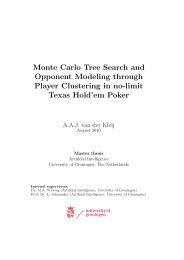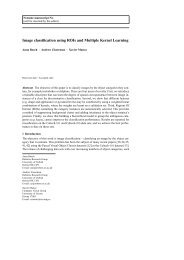Presuppositions in Spoken Discourse
Presuppositions in Spoken Discourse
Presuppositions in Spoken Discourse
Create successful ePaper yourself
Turn your PDF publications into a flip-book with our unique Google optimized e-Paper software.
Chapter 2<br />
Julia doesn’t have a brother from the set of worlds where Julia bakes cookies,<br />
rather than remov<strong>in</strong>g it first from all the world, and then tak<strong>in</strong>g only the worlds<br />
where Julia bakes cookies.<br />
In some examples the presupposition is related to the <strong>in</strong>formation <strong>in</strong> the<br />
antecedent of the conditional. For these examples some researchers have argued<br />
(Beaver, 1992, to appear) that a conditional presupposition is actually the correct<br />
prediction, and they have argued that the b<strong>in</strong>d<strong>in</strong>g theory fails <strong>in</strong> that it can’t<br />
account for these conditional presuppositions, for example:<br />
(59) If Fred is a scuba diver, then he will br<strong>in</strong>g his wet suit. 15<br />
Here it seems that it is more likely that we want a conditionalized presupposition,<br />
that is that Fred has a wet suit is cont<strong>in</strong>gent on him be<strong>in</strong>g a scuba diver. However,<br />
these counterexamples all seem to share an <strong>in</strong>tuition that there is a potential<br />
entailment relationship or an anaphoric relationship between the antecedent and<br />
the presupposition, and that this relationship makes the presupposition already<br />
satisfied <strong>in</strong> the antecedent, prevent<strong>in</strong>g the presupposition from be<strong>in</strong>g globally<br />
accommodated.<br />
Intermediate accommodation is also a problem for the satisfaction theory<br />
because <strong>in</strong> this theory there is no mechanism for representation. For example,<br />
consider how updat<strong>in</strong>g proceeds with a conditional of the form S 1 → S 2{p}. If the<br />
presupposition needs to be accommodated <strong>in</strong> the antecedent of the conditional we<br />
run <strong>in</strong>to problems. Accord<strong>in</strong>g to the update rules given <strong>in</strong> (55), c+[ S 1 → S 2{p}] is<br />
the same as c – ( c+[ S 1 ] – c+[ S 1 ] [ S 2{p}]). First, the context is updated with<br />
the <strong>in</strong>formation <strong>in</strong> S 1 , i.e. c+[ S 1]. This results <strong>in</strong> a context we can call c’. Now<br />
our expression is c – ( c’–c’+[ S 2{p}]) and our next step is to update c’ with [<br />
S 2{p}], i.e. c’+[ S 2{p}]. But first we have to make sure that the presupposition p is<br />
satisfied. Because we began with an empty context, we will need to accommodate<br />
p. 16 Local accommodation would be possible because we could revise the second c’<br />
to one that satisfies p. But there is no context <strong>in</strong> our current expression that can be<br />
revised to result <strong>in</strong> <strong>in</strong>termediate accommodation. For <strong>in</strong>termediate accommodation<br />
we need to “back up” to the second c <strong>in</strong> our orig<strong>in</strong>al expression, i.e.: c –<br />
(c+p+[ S 1 ] – (c+[ S 1 ][ S 2{p}]) ) But because contextual update proceeds<br />
<strong>in</strong>crementally we will never know if we need to <strong>in</strong>termediately accommodate until<br />
after we have made a contextual revision that prevents <strong>in</strong>termediate<br />
accommodation. That is, at the po<strong>in</strong>t <strong>in</strong> time where we realize that we need<br />
<strong>in</strong>termediate accommodation our expression is c – ( c’–c’+[ S 2{p}]). And because<br />
we don’t keep a derivational history (which would <strong>in</strong> effect be a level of<br />
representation, someth<strong>in</strong>g CCS argues is unnecessary) we can’t get back to the<br />
15 This example is from Geurts (1999), p. 97, and he attributes it to Manfred Krifka.<br />
16 If p had been part of the <strong>in</strong>formation <strong>in</strong> S1 then p would already be satisfied.<br />
38



